 "Our gospel came to you not simply with words, but also with power, with the Holy Spirit and with deep conviction" (1 Thessalonians 1:5). Upon hearing the good news that Jesus was the Messiah, that he died to set them free from their sins and to bring salvation to them, many people came to believe in Jesus. These words of the gospel message delivered by Paul and Silas were accompanied by powerful works of the Holy Spirit to heal and deliver people. People's lives were changed. They were set free from the power of sin and eternal death to live in the freedom that Jesus brought. They received the good news with such conviction that they were able to suffer persecution without faltering, even as new believers. Paul thanked God for the way in which they had received the good news. He said, "And we also thank God continually because, when you received the word of God, which you heard from us, you accepted it not as the word of men, but as it actually is, the word of God, which is at work in you who believe" (1 Thessalonians 2:13). They had set their lives on a new path. What lay around the bend was unknown but they knew that with the power of God they could face anything. The word of God was at work in them. For Reflection: What changes has the gospel, the word of God, brought in my life? Let us pray. I thank you, Father, that someone preached your word to me and I too came to believe in your word and the power of your death and resurrection. I thank you for all who have preached your word to me and I thank you for opening my heart to receive it.
0 Comments
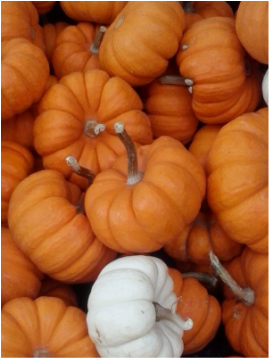 Paul always began his letters with greetings and thanksgivings. His first letter to the people in Thessalonica is no exception. The purpose of the letter is to answer the questions of this young church but he begins with praise and encouragement. Paul assures them that he is constantly praying for them for he knows that they live in a city that is an international trading center with many non-Christian influences in their daily lives. Paul also knows that they have been under persecution because he himself had to flee not that long before he sent this letter back to them. And what does Paul recall about them? Their work produced by faith, their labor prompted by love, and their endurance inspired by hope in Jesus (1 Thess 1:3; see also 1 Corinthians 13:3). Faith, hope and love are the three theological virtues, supernatural virtues, given by God to help us live the Christian life, growing in love with God and others. Paul is commending them for already growing in these virtues even as a young church. For Reflection: Who needs to hear some praise and encouragement today? Could I be commended for my work produced by faith, my labor prompted by love and endurance inspired by hope in Jesus? Let us pray. Father, I thank you for my family and friends who encourage me. I thank you particularly for those who encourage me in faith, prompt me to love and inspire me to hope.  With regard to the prophets, such as Elijah whom we've been reading about, I'm not sure how far in advance God spoke to them about what he wanted them to do. For example, we don't see, "God said to him, 'Next month I want you to go to the desert.'" It always appears to be immediate instructions that are given. Sometimes there are long periods when the prophet is not speaking for God. Elijah waited during the 3 years of the drought before God told him to go back and speak to King Ahab again. What did he do during those 3 years? We could assume he did whatever type of work he was doing before God called him to speak to Ahab. Although he fled his home and went to Zarephath, perhaps he had a skill or trade that could be practiced anywhere. But even if he was able to practice his trade in Zarephath, he had left his home and his family behind. Nor do we know how old he was. Was he about the same age as Ahab? Older? Younger? What we do know about Elijah is that he had a relationship with God; he listened to God; he waited on God; he was devoted to God. When God spoke, Elijah listened. For Reflection: Where am I? Do I have a relationship with God? Do I listen to God? Do I wait on God? Am I devoted to God? If God called me to drop everything and do something for him, would I do it? Let us pray. God, I tell people you are the most important person in my life, but I see now that may true. I'm not sure that I could drop everything to follow your instructions. How do I build my trust in you to the point where I could do that? 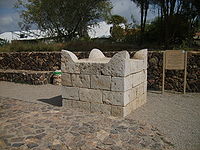 It's showdown time at Mount Carmel. Ahab and Elijah meet and Elijah throws down a challenge. King Ahab is to gather the 450 prophets of Baal that he has been taking care of and Jezebel is to present her 400 prophets of Asherah (nature and fertility gods) to stand in a test against Elijah, prophet of the Lord. Elijah tries to whip up enthusiasm and faith among the people of Israel, but not even he can succeed at that. They want to wait and see who wins the challenge. The challenge (as issued by Elijah): "Get two bulls for us. Let them choose one for themselves, and let them cut it into pieces and put it on the wood but not set fire to it. I will prepare the other bull and put it on the wood but not set fire to it. Then you call on the name of your god, and I will call on the name of the Lord. The god who answers by fire - he is God" (1 Kings 18:23-24). The outcome: The false prophets prayed from morning until noon. Nothing. They prayed from noon until evening. Nothing. Elijah prepared the altar of the Lord. He had the wood soaked in water until a trench around the altar was also full of water. Elijah prayed once. "Then the fire of the Lord fell and burned up the sacrifice, the wood, the stones of the altar and the soil, and also licked up the water in the trench" (1 Kings 18:38). For reflection: Elijah let the other prophets have first choice of the bulls to be offered. The bull was one of the symbols of Baal representing lust for power and sexual pleasure. Those are still powerful gods today. Am I dedicated only to the one true God or are there others in my life? Let us pray. You alone are holy. You alone are the Lord. You alone, Jesus Christ, are the most high.  God has now worked two miracles regarding food for Elijah. First, he fed him through ravens in the wilderness. Second, he fed him through the widow of Zarephath. The third miracle related to Elijah, so far, is that God has withheld rain from Israel in order to prove to King Ahab that he is the one, true God. Elijah is biding his time, waiting for the next call from God, when the son of the widow becomes ill and stops breathing. The woman immediately blames this on Elijah. Why not? By now she knows that not only is he a foreigner but also an enemy of the King of Israel. Surely her housing of this man has brought this evil upon her (1 Kings 17:17-18). Elijah ignores the accusation and God uses Elijah to raise the boy back to life. This saving act, more than anything else, convinces the woman that Elijah's God is the true God and she has done the right thing by taking him in. "Now I know that you are a man of God and that the word of the Lord from your mouth is the truth" (1 Kings 17:24), is her confession of faith. The multiplication of food had not convinced her, but bringing her son back to life has. For Reflection: How many miracles does it take to convince me that God is at work? Let us pray. Lord, I can be so hard-headed and disbelieving sometimes. Help me to recognize you in my life every day. 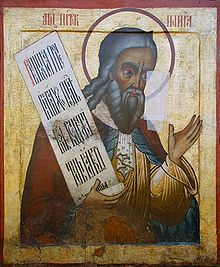 Elijah is one of God's great prophets in the Old Testament. Elijah stood up to wicked King Ahab of Israel and his wife Jezebel and spoke God's truth to them. Ahab, largely due to the influence of Jezebel, had rejected worship of the one, true God and had begun not only to worship Baal but also built a temple for Baal. He erected a totem pole for Asherah. Baal and Asherah were nature gods or fertility gods. So when Elijah steps up and declares to Ahab that there will be no rain in the next few years except at Elijah's word (1 Kings 17:1), he is directly challenging the nature/fertility gods of Ahab. The gauntlet has been thrown down and God guides Elijah in finding food and water while hiding from the wrath of Ahab. God first leads Elijah to the Kerith Ravine where he is brought bread and meat twice a day by ravens and he drinks from the brook in the ravine as long as it continues to flow. For Reflection: It is no small matter to challenge a king and a false god. But God inspired, enabled, and empowered Elijah to do what was needed. And he backed up Elijah's word. Ahab probably didn't believe Elijah in the beginning. But when the drought and famine became severe Ahab realized that Elijah had spoken the truth. Am I more like Elijah or Ahab? Let us pray. Jesus, I want to be more like Elijah than Ahab. I want to stay close to you no matter what the people around me are doing.  It is hard to imagine living under persecution for being Christian (or any faith belief), but Christians have the words of Jesus who tells us to "fear not." That's much easier said than done; however, I think Jesus meant it. If we know that when we die we will spend eternity in the Kingdom of God, then we need not fear death. So for Christians fear should not arise from death itself. Many of us, though, may fear what comes before death - suffering or pain. Is Jesus telling us not to fear suffering or pain? Well, Scripture says that perfect love (God) casts out all fear (1 John 4:18), but it appears to me that verse is meant for the day of judgment. If we consider Jesus' agony in the garden of Gethsemane (Mark 14:32-42; Matthew 26:36-46), Jesus is concerned about something. But what is it that overwhelms him? Is it death itself? or the pain of the whipping and crucifixion to come? or the weight of the sins of the world? For reflection: Honestly, I don't know but I don't think it was the prospect of death itself that caused Jesus such anguish. I think it was either the physical pain to come or the weight of the sins of the world. What do you think? Let us pray. Jesus, only you know what the persecuted Christians around the world are facing. We thank you for being with them in their time of testing and temptation, and we thank you for holding them like the Good Shepherd you are. Strengthen their faith in the face of the enemy. May your Name be always in their minds, and on their lips and in their hearts.  Sit, walk, build, imitate, love, submit. What is next in Paul's exhortation to the church in Ephesus? Stand. Yet we cannot move into the standing position if we do not progress through the earlier ones. And whereas walking comes out of sitting in the heavenly realms with Christ, so does standing. Sitting is our place of rest and nourishment. Sitting is our grounding. We must be grounded and rooted in Christ and what he has done for us before we endeavor to do anything with him. We cannot do anything for Christ, but we can do many things with him who strengthens us and enables us to fulfill our calling, our destiny to help establish the kingdom of God on earth. It is sitting and then walking, imitating, loving and submitting that enable us to be "strong in the Lord" and to "put on the full armor of God" (Ephesians 6:10-11) so that we can stand. We construct our own set of armor while sitting and walking. We each have our own belt of truth, breastplate of righteousness, shoes of the gospel of peace, shield of faith, helmet of salvation and sword of the Spirit, the Word of God. Our belt of truth may be stronger than someone else's, but their shield of faith may be stronger than ours. Together we are one body of Christ equipped with the strongest armor to stand against the enemy. It is important not to stand alone, but to stand as one with the body of Christ. For Reflection: Am I sitting with Christ? Am I walking with him? Am I standing with Christ and with his body, or am I standing alone? Let us pray. God, you are my refuge and strength. I sit with you, I walk with you, I stand with you. 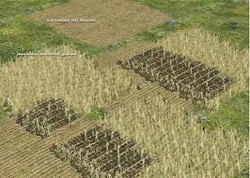 In order to walk our path we must know who we are in Christ. Let's review who we are. We are God's children, heirs to all of his promises and heirs of the kingdom. We have the Holy Spirit on deposit within us guaranteeing our inheritance. We are blessed with every spiritual blessing. We are chosen, forgiven, holy and blameless. We are redeemed through his blood. We are God's masterpiece. We are members of Christ's body, the church, of which Christ is the head. So we are under the headship of Christ. And let's not forget we are loved. This list of who we are is just what Paul outlines in his letter to the Ephesians. He adds more in his other letters. Given who we are, our life on this earth should reflect what Jesus has done for us. Paul spends the second half of his letter to the community in Ephesus outline how we should live. Who we are in Christ is God's gift to us for believing in his Son Jesus. We believe; He gives. We do nothing to deserve it or earn it. We just receive it. Then, in gratitude, we try to act like we have it. We don't always succeed, but we keep practicing. We do our best. For reflection: Where or when did I do well today? Where or when could I have done better today? Let us pray. Jesus, as I look back over my day, I can see you in certain events, but not others. Yet I know you are always with me. Help me to look for you at the times I find the hardest. |
AliceI started this website and blog on May 1, 2012. I am a Catholic who has been in ministry for many years. I first developed what I would call a close relationship with Jesus in the early 1970s. Ever since then I have been praying with people for healing and other needs. It is because I have seen so many of these prayers answered that I am so bold as to offer to pray for you individually through this website and phone line. Archives
July 2021
Categories
All
|
Proudly powered by Weebly

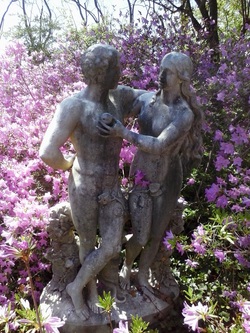
 RSS Feed
RSS Feed